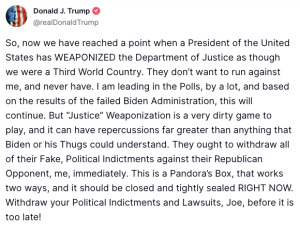Politics
Colorado Supreme Court Rules Trump Ineligible for 2024 Presidential Ballot
In an unprecedented verdict, the Colorado Supreme Court declared former President Donald Trump constitutionally unfit to appear on Colorado’s 2024 presidential ballot.
Announced on Tuesday afternoon, the judgment represents the first time a state supreme court has directly confronted and decided on the essential debates concerning Trump’s qualifications for future office.
Grounded in the insurrection clause of the U.S. Constitution, the court concluded that Trump is barred from the presidency under this clause. As a result, the Colorado secretary of state has been instructed to remove Trump’s name from the state’s Republican presidential primary ballot.
The decision, a narrow 4-3 verdict, is on hold for appeal until January 4.

The case revolves around a petition filed by a group of Colorado electors, both registered Republican and unaffiliated voters, in the Denver District Court. The petitioners sought to prohibit the Colorado Secretary of State from placing Trump’s name on the Colorado Republican presidential primary ballot.
They based their argument on Section Three of the Fourteenth Amendment to the U.S. Constitution, asserting that President Trump was disqualified from seeking the presidency due to his alleged engagement in insurrection on January 6, 2021.
The section was originally intended to prevent former Confederate officials and military officers from returning to positions of power after the Civil War, but its provisions are still part of the Constitution and can theoretically be applied today.
The Denver District Court conducted a five-day trial and found “clear and convincing” evidence that President Trump engaged in insurrection as defined in Section Three. However, the court concluded that Section Three does not apply to the President, and thus denied the petition to keep President Trump off the presidential primary ballot.
“The sum of these parts is this: President Trump is disqualified from holding the office of President under Section Three; because he is disqualified, it would be a wrongful act under the Election Code for the Secretary to list him as a candidate on the presidential primary ballot,” the court document wrote.
This decision was reviewed by the Supreme Court of Colorado, which affirmed in part and reversed in part. The Supreme Court held that the Election Code allows the Electors to challenge President Trump’s status as a qualified candidate based on Section Three and that Congress does not need to pass implementing legislation for Section Three’s disqualification provision to be effective.
The court also concluded that judicial review of President Trump’s eligibility under Section Three is not precluded by the political question doctrine and that Section Three applies to the office of the Presidency.
Ultimately, the Supreme Court ruled that President Trump is disqualified from holding the office of President under Section Three, making it a wrongful act under the Election Code for the Secretary to list him as a candidate on the presidential primary ballot. However, the ruling is stayed until January 4, 2024, to maintain the status quo pending any review by the U.S. Supreme Court.
This case presents several issues of first impression and explores uncharted territory in the application of the Fourteenth Amendment’s Section Three in the context of presidential eligibility.
A spokesperson for Trump’s campaign criticized the ruling and indicated that an appeal to the U.S. Supreme Court was likely to be filed soon.
“Unsurprisingly, the all-Democrat appointed Colorado Supreme Court has ruled against President Trump, supporting a Soros-funded, left-wing group’s scheme to interfere in an election on behalf of Crooked Joe Biden by removing President Trump’s name from the ballot and eliminating the rights of Colorado voters to vote for the candidate of their choice,” Steven Cheung said in a statement.
“We have full confidence that the U.S. Supreme Court will quickly rule in our favor and finally put an end to these unAmerican lawsuits.”







